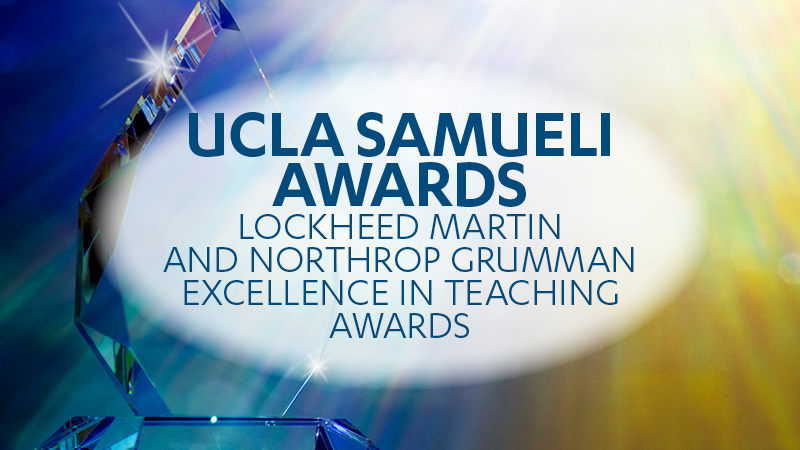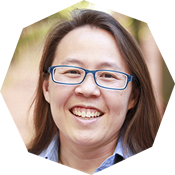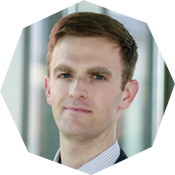UCLA Engineering 2021 Award Recipients

Every year, the UCLA Samueli School of Engineering selects and recognizes outstanding achievements by a number of its alumni, faculty members and students who have excelled in various fields. These awardees are honored at a formal school ceremony. Due to the pandemic, the in-person award presentation and public recognition of the 2021 honorees were rescheduled for May 2022. Below are profiles of the recipients for the Lockheed Martin Excellence in Teaching Award and the Northrop Grumman Excellence in Teaching Award.

Lockheed Martin Excellence in Teaching Award
Veronica Santos
Professor of mechanical and aerospace engineering and bioengineering
Associate dean for equity, diversity and inclusion and faculty affairs
Spoiler alert!
Veronica Santos runs a secret quarter-long competition in her undergraduate classes, with winning students receiving some UCLA swag at the end of an academic term. Without giving away further details, know that, for Santos, class participation is key.
That’s just one example of the many creative ways Santos enhances her classroom teaching, all with the goal of facilitating student learning.
She fosters an open and inclusive environment in her classes, using a variety of platforms for students to connect with her and one another to build a sense of community.
Another key to Santos’ teaching success is her encouragement for students to share anonymous feedback midway through each course. This allows for immediate adjustments of her teaching, rather than waiting for traditional end-of-course evaluations that will not help students who provided the feedback.
Santos has also been involved in every detail of curriculum development, incorporating new student-centered learning technologies and tools into her courses. For example, in collaboration with faculty who also teach the Mechanical and Aerospace Engineering 263 course series on robotic systems, Santos has developed a stand-alone, take-home robotics kit that students use to build robots for their term projects. The course is now also available to all UCLA undergraduate students as an elective.
Her teaching efforts have earned her high marks in student course evaluations and praise from university instructional technology staff.
The Lockheed Martin Excellence in Teaching Award, which is open to all UCLA Samueli faculty, is the latest of several teaching awards Santos has received, including the 2016-17 Mechanical and Aerospace Engineering Department teaching award. Prior to joining UCLA in 2014, Santos was a faculty member at Arizona State University where she was thrice an honoree. In 2010, she was one of 53 faculty nationwide invited to participate in the National Academy of Engineering Frontiers of Engineering Education Symposium for early career faculty who practice innovative techniques in engineering education.
Santos directs the Biomechatronics Laboratory at UCLA, which conducts research to improve quality of life and quality of work by advancing artificial hands and their control in human-machine systems. This includes studies in hand biomechanics, human-machine systems, tactile sensing and perception, and prosthetics/robotics for grasp and manipulation.

Northrop Grumman Excellence in Teaching Award
Aaron Meyer ’09
Assistant professor of bioengineering
Since joining the Bioengineering Department at UCLA in 2017, Aaron Meyer has led the integration of data analysis techniques into the curriculum, making strides in better preparing students for the central role these tools now play in the field.
Meyer teaches two upper-division courses: Bioengineering 167L, the major’s sophomore-year laboratory course, and Bioengineering C175, a course he developed from the ground up on the application of machine learning and data-driven modeling in bioengineering that has now been incorporated as a core requirement for the bachelor’s degree.
With the addition of complementary activities such as lectures, discussion questions, real-life applications and student-led review sessions, Meyer’s courses and homework assignments are designed to guide students to discover new concepts and develop problem-solving intuition.
One way Meyer helps students overcome the challenges of studying machine learning is by discussing ways to reapply the same idea when tackling different complex ML fields, including statistics, computer science and areas of application in bioengineering. Students are challenged to identify, problem-solve, validate and implement solutions to real-world applications of data analysis before presenting and critiquing their findings.
This approach has consistently earned Meyer stellar reviews on course evaluations, with some students commenting that his teaching has inspired them to pursue graduate studies and careers in bioinformatics and data science.
Meyer has also taken on a leadership role in the integration of educational activities at the interface of biology and computation across the UCLA campus. He serves on the advisory committee for the Computational & Systems Biology major in the Division of Life Sciences, spearheads the effort to update the Bioengineering Department’s Biomedical Data Science track and co-leads the Undergraduate Research Center’s Integrated and Interdisciplinary Undergraduate Research Program — a selective two-year program designed for juniors and seniors interested in biomedical research careers.
For his extraordinary contributions, Meyer has been selected for the Northrop Grumman Excellence in Teaching Award, which is reserved for junior faculty members.
Meyer received his B.S. in bioengineering from UCLA in 2009 and a Ph.D. in biological engineering from the Massachusetts Institute of Technology in 2014. He spent three years as a principal investigator and research fellow at the Koch Institute for Integrative Cancer Research at MIT before joining the UCLA faculty. Meyer’s research group applies experimental and computational strategies to measure, model and therapeutically manipulate cell-to-cell communication, with applications in the development of immune and cancer therapies.
